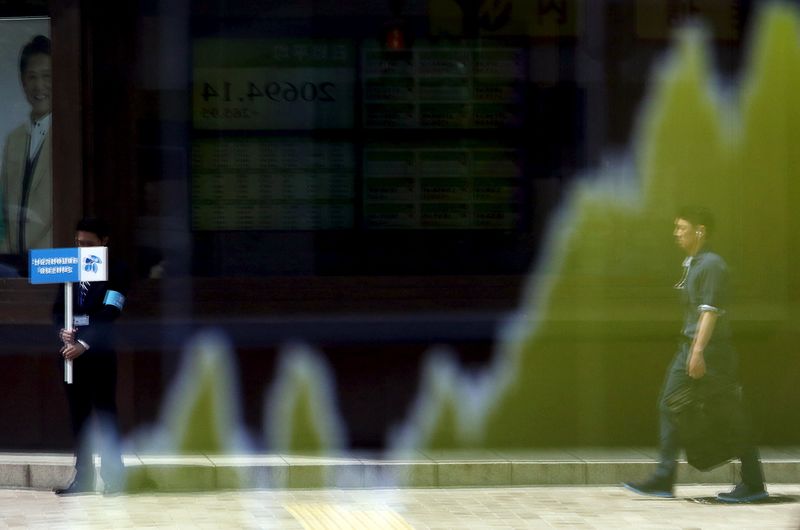Hansen, Mueller Industries director, sells $105,710 in stock
Updates at 00:40 ET (04:40 GMT) with China trade data, India open
Investing.com-- Most Asian stocks rose on Monday after soft U.S. payrolls data ramped up bets on a September interest rate cut, with Japanese stocks leading gains on strong economic growth data, even after Prime Minister Shigeru Ishiba unexpectedly resigned.
S&P 500 Futures rose 0.2% in Asian trade, recovering from a negative Friday close on Wall Street after the nonfarm payrolls data also sparked concerns over slowing U.S. economic growth.
But markets remained largely optimistic that the Federal Reserve will cut interest rates by at least 25 basis points during its September 16-17 meeting. Focus this week is also on key U.S. consumer inflation data.
Japan’s Nikkei 225 soars on strong GDP; PM Ishiba resigns
The Nikkei 225 and TOPIX indexes rose 1.5% and 1.1%, respectively, coming close to record highs last seen in mid-August.
Revised second-quarter gross domestic product showed the Japanese economy grew much faster than initially estimated, amid strong exports and private spending.
Growing doubts over more interest rate hikes by the Bank of Japan also boosted Japanese shares, especially as the country faces heightened political uncertainty.
Prime Minister Ishiba said on Sunday that he will step down as the leader of the Liberal Democratic Party, just weeks after its ruling coalition suffered a crushing defeat in the upper house elections.
Ishiba signaled that his resignation was also after Tokyo had secured a trade deal with the U.S., which will entail relatively lower tariffs on Japanese goods.
But his abrupt resignation now opens the door to a potential leadership struggle in the world’s fourth-largest economy, especially after the LDP lost its majority in the upper house.
Candidates tipped to replace Ishiba are viewed as much less fiscally conservative than the outgoing prime minister.
China stocks mixed as August exports underwhelm
China’s Shanghai Shenzhen CSI 300 fell slightly, while the Shanghai Composite and Hong Kong’s Hang Seng rose about 0.2% each.
Government data showed the country’s trade balance grew a touch more than expected in August. But export growth slowed sharply and missed expectations, signaling some weakness in offshore demand amid cooling economic conditions in the country’s biggest markets.
U.S. trade tariffs on China also remained relatively high, which in turn hurt demand for exports. Chinese imports also grew at a much weaker-than-expected pace, signaling soft domestic demand.
Chinese stocks logged stellar gains in August as investors bet on more stimulus measures from Beijing, as well as more promotion of self-reliance for artificial intelligence technology. This had greatly boosted local tech stocks.
But Chinese markets were hit with a wave of profit-taking so far in September. Focus this week now turns toinflation data for more cues on a recovery in the world’s second-largest economy.
Still, the Hang Seng was buoyed by some gains in heavyweight Chinese stocks. Baidu rose as much as 4% after announcing plans for a note issuance, while peers Alibaba and Tencent Holdings Ltd (HK:0700) also advanced.
Alibaba surged over 4% after it released a new AI model which it claimed was its biggest and most intelligent yet.
Broader Asian markets were mostly upbeat as Friday’s U.S. payrolls data sparked bets that a Fed rate cut was imminent. But concerns over a cooling U.S. economy kept gains limited.
India’s Nifty 50 index rose 0.3% in early trade, although the index was nursing losses from the prior week as investors fretted over Washington imposing 50% trade tariffs on New Delhi.
South Korea’s KOSPI added 0.1%, as did Singapore’s Straits Times index.
Australia’s ASX 200 lagged as concerns over slowing economic growth pushed investors out of economically sensitive sectors such as miners and financials.
